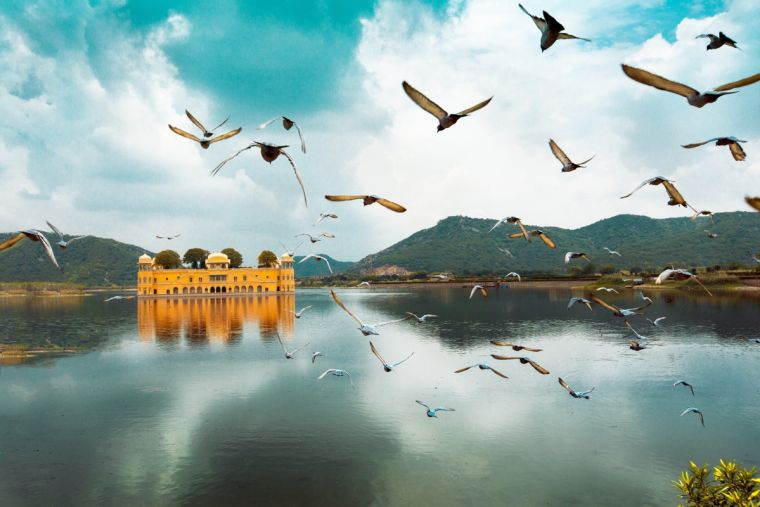70 years after independence, the Indian Church faces opportunity

Today, August 15, India celebrates 70 years of independence.
It is a proud moment for the world's largest democracy. Though still a young democracy, the world should celebrate how far India has come.
In 1947, India was an impoverished, undeveloped country, grappling with the horrors and violence of the British Partition. Today, India boasts the fourth fastest-growing economy of the world. Revolutions in agriculture, technology and higher education in the past few decades have transformed the Indian economy, and the emergence of an educated civil society has propelled us forward on the world stage.
India has one of the most aspirational and youngest populations anywhere in the world — 65 per cent of Indians are under the age of 35 — and they're restless for more economic development and freedom.
Prime Minister Modi's rise to power can be largely credited to his ability to recognise and connect to the aspirations and dreams of the new India. The promise of economic development, mixed with a message of anti-government corruption, resonated powerfully with ordinary Indians.
India also stands as one of the most richly diverse nations in the world. We boast the world's second largest Muslim population and one of the oldest Christian communities. The wisdom of the founding fathers, namely Mahatma Gandhi, Jawaharlal Nehru and especially the great Dr. BR Ambedkar, gave us our constitution, which promises equality, justice and freedom for all.
However, despite progress under the present government, India is still beset by the persisting challenges of poverty, illiteracy, casteism, violence against women and communalism. On her 70th birthday, too many millions still live on less than one dollar a day and extremists remain focused on limiting freedom of expression.
For Prime Minister Modi and his followers, the question remains whether he will represent the best of Hinduism — as did Mahatma Gandhi and Swami Vivekananda, whom the prime minister quotes frequently — or if the extremist elements will extract their pound of flesh for supporting him politically and continue their divisive, casteist, anti-freedom and anti-capitalist agenda. We pray our prime minister will succeed in his developmental, all-inclusive agenda.
For the church in India, these challenges present a great opportunity to practically work out the good news of the Kingdom of God Jesus announced.
This begins by avoiding religious bigotry and aiming for peace among all faiths. India now more than ever needs peacemakers who will be called the sons and daughters of God, even as religious and caste violence emerges from time to time. The church must always fight for the unity and integrity of India whomever is in power.
The church must also reach with the unconditional love of Christ to those who are suffering, regardless of caste or religious background. In India, the poor have no access to quality English medium schools, medical care or employment and are often deprived of fundamental human rights. The rich have bought into the culture of materialism, and generosity is too rare in our culture. In a country where grueling poverty marks day to day life for millions of men, women and children, the church has both the mandate and opportunity to respond with generosity. The church can also assist the government in providing sustainable solutions to those in need.
Of all the oppressed people groups in India, I believe none suffers more than women. The church cannot ignore this. The abuse and violence against women is a blight on our entire world. How can a modern nation allow a 10-year-old to be raped every 13 hours? How is it that gang rapes of minors and young women are prevalent in various faith communities? India will be truly developed and free when her women are freed and equal, and have the rights not just in the Indian Constitution but that Jesus promised in the Kingdom of God. Thankfully, the Indian government is also moving step-by-step in the right direction on this issue having passed its first human trafficking law this year. The church too is focused on providing rehabilitative services to those in need.
In terms of Christian unity, the institutional church needs to accept there is a silent and increasing group of people from all backgrounds who have experienced personal faith in Jesus Christ. Their numbers now exceed the members within the institutional church, and I state this from my position as part of the institutional Anglican Church. I cannot afford to have a stepfather-like attitude to this movement of God.
This movement has not sprung up through coercion or forced or fraudulent means. Educated people of various backgrounds have found Jesus Christ. I've said to my friends in the Hindu right that even upper caste Brahmins and others have had spiritual encounters with Christ — like Sadhu Sundar Singh and Pandita Ramabai once did. I find these believers everywhere in my travels and work across India.

I do not think persecution will cause the demise of this silent movement. In fact, it will most likely cause it to grow more because of the spiritual power and dimensions of this phenomena. This is the kind of faith which throughout the centuries has emboldened Christians to lay down their lives for Jesus.
The spiritual dimension of the Holy Spirit's work cannot be explained away as mere religion. The numerical size of Indian Christians is greater than what the census figures tell us. In Tamil Nadu alone, the Pentecostal synod tells us that there are more than 50,000 Pentecostal Churches. The good citizenry of this church constituency is what led the state to abrogate the anti-conversion law that was passed by the late Chief Minister Jayalalithaa.
The unity of all those who honour and follow Jesus as Lord and Saviour is important not only for the health of the church but for India. The church can confidently say, 'Jesus and India first'. There is no contradiction between being a Christian and an Indian. As much as we should care for the poor of the world and injustice everywhere, Jesus wants us to care about our nation and people.
On this 70th anniversary of Indian independence, the church remains committed to showing God's love and hope for India.
Most Rev. Dr. Joseph D'Souza is the moderating bishop of the Good Shepherd Church and Associated Ministries of India. He also serves as the president of the All India Christian Council. He is the recipient of numerous awards and accolades for his work as a human rights activist. He is also the founder and international president of the Dalit Freedom Network. He can be reached at: moderator@gsoim.org.











